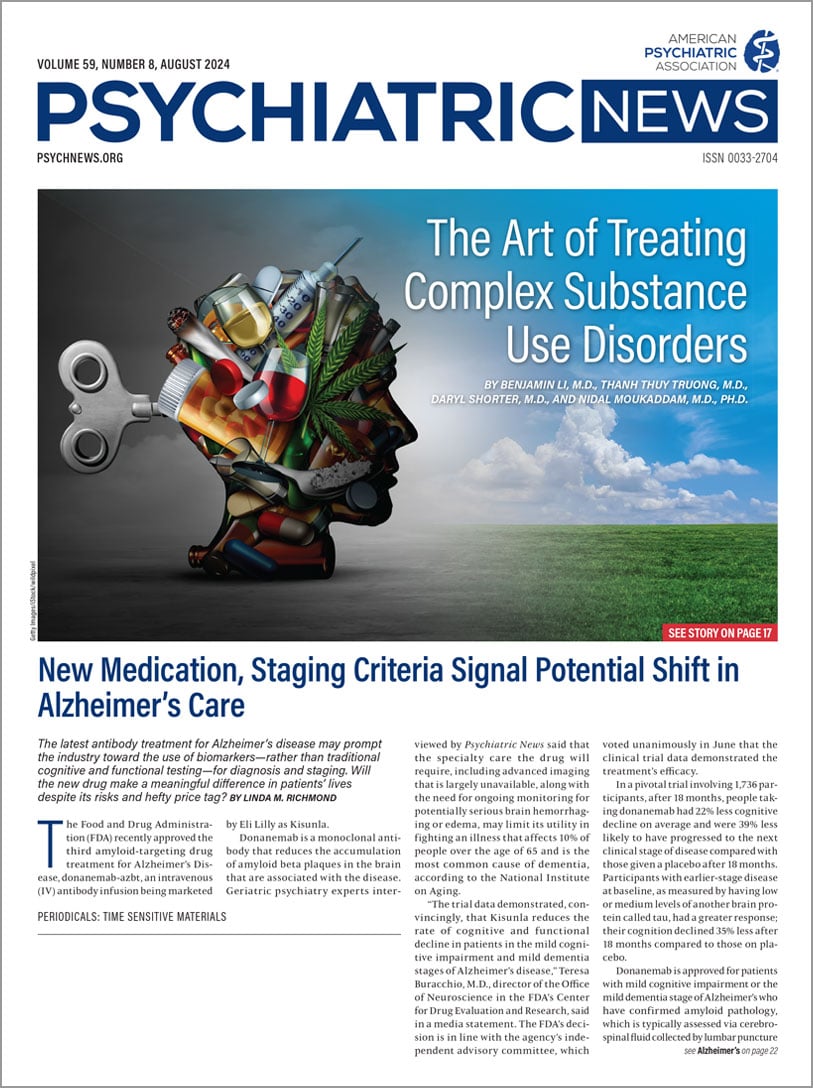The risks associated with the use of psychotropic medication in the context of surgery or medical illness should always be balanced against the potential hazards of withdrawal symptoms or relapse of the psychiatric disorder, said James Levenson, M.D., in a presentation at APA’s 2024 Annual Meeting titled “Psychopharmacology in the Medically Ill: An update on Practical Pearls for the Practicing Psychiatrist.”
Those risk-benefit calculations are seldom clear-cut—in some cases, existing evidence is equivocal or nonexistent—and prescribers should not automatically discontinue psychiatric medications because of a perceived risk, Levenson said. He is the Rhona Arenstein Professor of Psychiatry and chair of the Division of Consultation-Liaison Psychiatry at Virginia Commonwealth University. He is also co-editor of the American Psychiatric Publishing book “
Clinical Manual of Psychopharmacology in the Medically Ill, 3rd edition,” with Stephen Ferrando, M.D., who also spoke at the meeting.
In comments to Psychiatric News, Levenson discussed the use of psychiatric medications for patients undergoing elective surgery, those with psychosis related to Parkinson’s disesase (PD), and those with cardiac disease or potential cardiac complications (see box below).
“Psychiatrists frequently encounter potential complications from prescribing psychiatric drugs to patients who have medical illnesses,” he said. “Some medical illnesses change the way the body absorbs and metabolizes and excretes drugs, and some diseases make people more sensitive to the side effects of our drugs. Those risks should be assessed proportionately and realistically. In psychiatry and in general medicine, there are seldom choices where one option poses all the risk.
“I worry that prescribers are sometimes overly cautious about adverse effects associated with psychotropic drugs,” Levenson said. An instance of this clinical ambiguity is whether to stop psychiatric drugs prior to elective surgery—an area in which there are, Levenson said, more opinions than evidence. Yet it is an important consideration; studies have found as many as 40% of patients undergoing elective surgery are taking psychotropic drugs or hypnotics, Levenson said.
Risks of continuing psychiatric drugs in the perioperative period include possible adverse interactions with anesthetics; interference with hemodynamic management (causing hypo- or hypertension), and postoperative complications such as excessive sedation or ileus (inability of the intestine to contract normally).
Those risks are counterbalanced by the possible decline or loss of therapeutic effect, rebound exacerbation of symptoms of mental illness, or withdrawal syndromes.
Levenson said the only class of drugs that should clearly be stopped prior to surgery are cholinesterase inhibitors, used in the treatment of Alzheimer’s dementia, because they can reduce or amplify the effects of paralytic agents used in general anesthesia. “There is a little risk in holding them [in the perioperative period],” Levenson said. “Their benefits occur over a long period and are marginal in any case.”
In a February 2022
paper in
Mayo Clinic Proceedings, the
Society for Perioperative Improvement and Quality Assessment published consensus recommendations on perioperative management of psychiatric medications that call for continuing most psychiatric drugs, including on the day of surgery, but stopping stimulants on the day of surgery. The recommendations also call for stopping lithium 72 hours prior to surgery.
While the recommendations represent a consensus of professional opinions, Levenson said they are based on very limited evidence, and he questions the recommendation to stop lithium. “I wouldn’t normally stop lithium because of the risk of destabilizing a patient with bipolar disorder,” he told Psychiatric News.
The risk of surgical or postsurgical bleeding associated with SSRIs and SNRIs is a related concern. Levenson said studies suggest a small, statistically significant increase in bleeding risk. But that increased risk has never led to a significant adverse outcome or need for transfusion. “I don’t think we need to worry about serotonergic antidepressants and elective surgery,” Levenson said. “The downside to stopping them right before surgery is that patients may experience withdrawal symptoms, which at a minimum will be uncomfortable, and may be confused as symptoms of a surgical complication.”
However, there is one area of prescribing in the context of medical illness where evidence is clear and where Levenson said clinical practice is falling short—the overprescription of high-potency antipsychotics for patients experiencing psychosis associated with PD.
Risperidone is one of the most commonly prescribed medications for psychosis associated with PD, yet it is among several antipsychotics that block D2 receptors (thereby affecting those areas of the brain required for fine-tuning of motor skills) and can worsen the symptoms of PD. He cited a 2019
report in
International Clinical Psychopharmacology that found that patients receiving the drug experienced greater deterioration in motor skills associated with walking and dressing, compared with patients receiving quetiapine.
And a 2020
report in the
American Journal of Geriatric Psychiatry found a higher all-cause mortality rate associated with use of high-potency antipsychotics (olanzapine, asenapine, brexpiprazole, iloperidone, lurasidone, paliperidone, risperidone, and ziprasidone) in patients with psychosis associated with PD compared with more appropriate choices—clozapine or quetiapine.
Levenson said quetiapine was shown to be effective and safe in an
open label trial. And clozapine has likewise been shown to be safe and effective in several randomized placebo-controlled trials at doses (6.25 mg/day to 50mg/day) well below those prescribed for patients with schizophrenia. Meanwhile, pimavanserin is an atypical antipsychotic that received FDA approval in the United States in 2016 specifically for hallucinations and delusions that accompany Parkinson’s disease psychosis—but it is enormously expensive (more than $50,000 a year).
“While clozapine and pimavanserin are the only drugs with RCT [randomized, controlled trial] evidence of efficacy and without worsening PD, it is reasonable to try quetiapine first because of fewer other adverse effects,” Levenson said. ■

